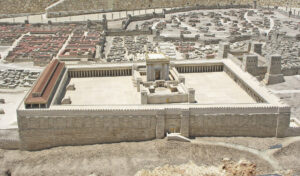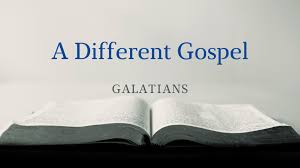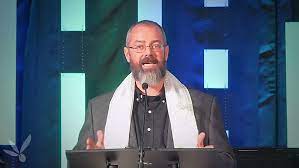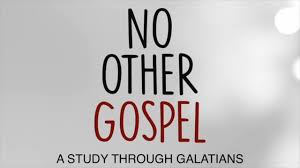Ay – Remember the Poor of Jerusalem 2: 6-10
Remember the Poor of Jerusalem
2: 6-10
Remember the poor of Jerusalem DIG: Why did Paul, Barnabas, and Titus go up to Jerusalem? Who is Agabus? How long did the famine last? What that before or after Paul went to Tziyon? Why were the Jewish believers in Yerushalayim in such a dire condition? What did extending the right hand of fellowship to Paul from the pillars of the Messianic community in Jerusalem mean to the spread of the gospel? Did the problem of the Judaizers go away? Why?
REFLECT: How often do we forget this crucial teaching. In our daily lives, do we make the mistake of only focusing on outward rituals, overlooking (perhaps even on purpose) those areas of the TaNaKh (Deuteronomy 15:11,24:10-22) that demand that we be concerned with the poor, the needy, and the destitute.
The apostles in Jerusalem endorsed Paul as an apostle to the Gentiles, and they endorsed his gospel of salvation equals faith-plus-nothing with one condition . . . that he remember the poor.
48 AD
After more than a decade, Paul went up to Jerusalem. He took Barnabas and Titus along with him. He went up because of a revelation (2:2a). According to the book of Acts, the revelation was a near historical prophecy delivered by a prophet from Jerusalem named Agabus, who predicted through the Ruach that there was going to be a great famine over all the Roman world (Acts 11:28). Like Joseph in Egypt preparing for the seven years of famine, Paul and Barnabas raised money for the famine relief from the church at Antioch. They brought it to Yerushalayim to help the Jewish believers there.
The Jewish believers in Jerusalem needed the help. Now the whole group of those who believed was one in heart and mind. No one would say anything he owned was his own, but they had everything in common. No one among them was needy, for all who were owners of lands or houses would sell them and bring the proceeds and set them at the feet of the apostles. And the proceeds were distributed according to the need each one had (4:32, 34-35). They assembled daily in the Temple courts to worship ADONAI and to wait for the coming of King Messiah. They were called the evyonim, or the poor ones. Their self-imposed poverty came from their radical dedication to our Master’s teachings regarding selling one’s possessions and giving to the poor. However, their self-imposed poverty had made the Yerushalayim poor ones especially vulnerable to the famine they had endured from 44 to 46 AD.50
Paul had taken advantage of the famine-relief trip to Jerusalem to seek a private audience with James, Peter. They were the pillars of the Messianic community. Reflecting back on their meeting, Paul remembered that those who seemed to be influential, James, Peter and John, whatever they were, makes no difference to me. Paul was not demeaning the acknowledged leaders but calling attention to the fact that office, position, eminence, that is, outward appearances, do not matter because God shows no partiality, as Peter had learned with some difficulty (Acts 10:9-48). But what does matter is the content and truth of the gospel; and in this, those leaders, who Paul knew of great importance in the life of the Messianic Community, added nothing to him or his message (2:6). They saw no defect in Paul’s gospel and treated him as an equal of apostolic rank with them, only requesting that he remember the poor.
On the contrary, far from demanding concessions, they saw that Paul had been entrusted with the Good News for the uncircumcised just as Peter was for the circumcised (2:7). At that point the Judaizers’ contention that Paul was preaching a deviant gospel message was refuted once-and-for-all. As Luke explains, not only did the Jerusalem Council vindicate Paul’s message of salvation equals faith-plus-nothing, but they also entrusted him with the primary responsibility of reporting their decision to the churches in Pisidian Antioch, Syria, and Cilicia – areas where his gospel had been severely criticized by the Judaizers (Acts 15:22-24).
For the same God who was at work in Peter as an apostle to the Jews, also was at work in Paul as an apostle to the Gentiles (2:8). When Paul returned to Yerushalayim several years later, the brothers and sisters welcomed [him and those with him], and when he began report to them in detail what God had done among the Gentiles through his ministry, James and the other elders began glorifying God (Acts 21:17-20). Contrary to the claim by some today’s traditional Jewish community that Jews should not be approached with the gospel, Scripture teaches us precisely the opposite. ADONAI specifically commissioned Peter to evangelize the circumcised, the Jews.51
Realizing the favor that had been given to me, James and Peter and John, who are the recognized pillars of the early Messianic Community, partnered together with Barnabas and me, so that we would go to the Gentiles and they to the Jews (2:9). The agreement therefore was that Paul and Barnabas should go as apostles to the Gentiles, and the Jerusalem apostles were to go as apostles to the Jews, both groups taking the same gospel. Paul was not only in doctrinal harmony with them, but in personal harmony with them as well.
James and Peter and John extended the right hand of fellowship (Greek: koinonia) to Paul. This was very serious. From the First Century Jewish perspective, this was far more significant than, “we shook hands on it,” as the right hand in Semitic thought had some major significance regarding approval. In common with most cultures, the TaNaKh and the B’rit Chadashah assign special significance to the right hand of strength, the right hand of blessing. This meant that Paul’s detractors could no longer claim that he was some kind of rogue, operating without Jerusalem’s knowledge or approval.
The next move was from the theological to the practical. Helping the poor. Certainly those things go together. Correct doctrine is never a substitute for good works (James 2:14-26). Paul had always been interested in helping the poor (Acts 11:27-30), so he was glad to follow the leaders’ suggestion. They asked only that we remember the poor – something I also was eager to do (2:10). Significantly, aorist verb was eager (Greek: espoudasa) indicates an action which he had been accustomed to take in the past. The phrase thus expresses Paul’s regular practice of keeping the Jewish believers’ welfare at heart.52
In addition, Paul regarded it as a matter of principle, for Gentiles to give material support to Jews. I am going to Jerusalem, bringing aide to the kedoshim, the holy ones. For Macedonia and Achaia were pleased to make some contribution for the poor among the believers in Jerusalem. Yes, they were pleased to do so, and they are under obligation to them. For if the Gentiles have shared in their spiritual blessings, they also ought to serve them in material blessings (Romans 15:25-27).
Even though the Jerusalem Council ended with Paul and the leaders of the Messianic community in agreement, it did not permanently solve the problem. The Judaizers did not give up, but persisted in interfering with Paul’s ministry and invading churches that he founded. Paul carried the Good News of the Council’s decision to the churches in Pisidian Antioch, Syria, and Cilicia (Acts 15:23), and other areas where he had ministered (Acts 16:4). But wherever Paul went, the Judaizers were sure to follow, sowing their seeds of discord. The curtain falls on this drama, but it will go up to reveal another. Once again God’s “freedom fighter” will have to defend the simplicity of the gospel, this time before Peter.53
Dear Heavenly Father. How much we love You! Thank You that the good news of Your gospel is open to not just to the Jews, Your firstborn son (Exodus 4:22); but also, to the Gentiles. Praise You that You appointed and prepared a special messenger, Paul, to give Your message to the Gentiles.” But, the Lord said to him [Ananias], “Go, for he is a choice instrument to carry My name before nations and kings and Bnei-Yisrael. For I will show him how much he must suffer for My name’s sake” (Acts 9:15).
What a joy it is to share Your good news! Even though sometimes sharing Your love does bring, mocking, and slander, when we think of how long eternity is-please give us the heart of compassion with wise words to share about the reality of heaven and hell. May the forever length of eternity and the eternal joy which the person would have in heaven, give us the joy and courage to share- despite any persecution. Please guide us to first pray for and then to share Your gospel with a friend. Help us to remember that hell is for an eternity and though we may get laughed at when we share about God– it is OK for we know that for all eternity we will have joy in Your presence.
Right now dear Father, we are asking for You to soften the heart of our friend named . . . . Please bring other people into their life to also share about You. May You work in their mind to draw them to You all during the day and even at night. Please let remove distractions, deceitful lies and anything else that is blinding them to the joy of accepting You as their Lord and Savior and receiving eternal joy! Help them to seek after You, to listen to Your words and to see the great peace that comes from following You. Praise You that You love all and all may come to You, if they are willing to listen and learn from You, as Yeshua said: It is written in the Prophets, “They will all be taught by God.” Everyone who has listened and learned from the Father comes to Me. (John 6:45). Please abundantly water the seed that the Holy Spirit helps plants and continue to bring people and experiences into their life to grow strong them in You, producing much fruit for You (Matthew 13:23).
How awesome it will be to see our friend in heaven for all eternity! Praise Your mighty power that freed and rescued us from sin’s grasp and for Your living in those who have chosen to follow You (Romans 8:9). How great that we don’t live the life of faith alone, but that You are always right there with us to help and to guide us. For God Himself has said, I will never leave you or forsake you (Hebrews 13:5). We love to tell about You because You are so Awesome! In Your holy Son’s name and power of resurrection! Amen









